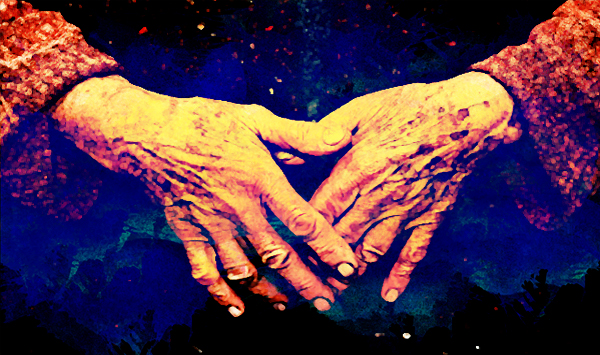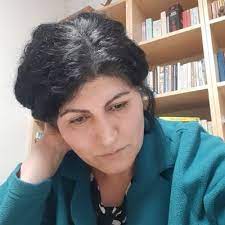Türkçe Nupel | Français | English
To see the other articles, follow this link
The deepest darkness of night took shelter in the morning’s chest. In the stable, Dappir and Derman’s eyes broke through the darkness. The two pairs of distraught eyes began gnawing at one another, little by little. Derman with her exhausted eyes looked at Dappir “you strangled… strangled…” she said. Then she cried rivers.
Dappir’s hands were sobbing, sweating, shaking, looking for a place to hide under her teats. A bed in which they could dream until eternity. “The child was stillborn,” Dappir said, lowering her eyes. Then she was silent……
Dappir hid Derman for another two days under a pile of grasses in the stable. She brought her warm milk, cooked plump dried mulberries for her but, no matter what she did, Derman did not put a thing to her mouth. She only drank a bit of water, she drank as if the water was bathing her pain, extinguishing the fire inside her, water, nothing else…
Memo was a believer. He was a man who had made vows to the huge mountains, prayed to the water, the tree, the sun, and who had shed so many tears. “Pity me, now, master of this earth and of the sky, show me the way.”
Memo woke up on that night bathed in sweat. He had dreamt. In this dream, Derman was dead! Under a holy tree, there was only Memo and Derman’s remains. For water, there was not even a drop of dew. His daughter was naked and Memo bathed her with his tears.es.
He rose and opened his hands toward the sun about to rise and began with a vow for everyone’s well-being, then for a place for himself in the corner. Then, he gathered all his children and his wife around the tin stove in which sparks were flying. Henceforth, no one must say a single word heavier than a rose to Derman. The god showing me the suffering from the loss of a child would be best to take his own life. They were going to eat under this roof and manage, no matter what their fate. They would see what was written on their forehead…
In a commanding voice, he sent his wife over to Dappir. His daughter was much too precious to be the prey of a “blond bum”, he had not raised her in poverty for nothing…
With hands on her chest, Dappir greeted Derman’s mother. As if the mountains had crumbled and Dappir had been buried under them. She poured all the pain of her hands on the mother, telling her everything. How she had proceeded, how she could not understand either, who would want to marry Derman with a bastard…It had happened all of a sudden, there you had it, all of a sudden…
They embraced and together cried for millenia over their fate.
On these lands, if there is a father behind a woman, if he is as solid as a mountain, unshakeable, she will not let herself be discouraged easily. She will not turn into a pebble, dust, smoke, she will not kill herself. Derman came back to the house with her suffering. She withdrew into herself. “Eh, yeah, no”. With these three words, she built a tomb deep within herself, where she stood guard day and night, she gave herself up to domestic tasks.
Storms broke out, rains fells, the snows from the huge mountains melted and filled the streams.
Mother Earth called up spring in all its splendors. Thanks to it, Derman got a bit of a grip on herself. She had taught all she knew, time would take care of the rest.
Derman was an open wound before Dappir’s eyes, an unending wound striking her hands with a stone. It could not go on this way, it was no longer possible. One morning she awoke with the roosters. She threw herself on the mountain paths and soon disappeared from view. She arrived in a hamlet, don’t ask how many villages further, at Cafer the shepherd’s, her kirve 1Three years earlier, Cafer had lost his wife to pneumonia, leaving four orphans behind her.
Dappir sat Cafer in front of her. She talked about Derman, and about everything that had happened: “Derman is wounded, she is young, candid, if you bind her wound, if you take care of her and heal her, she would be a good wife for you, a good step-mother for your children. Go and get her, take her, save Derman, save yourself and myself, in the name of the faith…”
Then, out of the pocket sewn into her belt, the took out a gold coin and left it in Cafer’s hands as calloused as stone. “It was the coin for my shroud, you will give it to the girl’s mother, as her milking right. Go, that I may be in peace” she said, and returned to her house, with the tomb in her hands.
Cafer had hoped for an eye, Dappir was offering him two. He descended like a deluge, Cafer, and in the blink of an eye, found himself at Memo’s door. He asked for Derman as his wife, with Allah’s blessing. The gold piece for Dappir’s shroud then found itself with the beads around the neck of Derman’s mother, like that of an older sister.
Derman did not wish for henna nor for betrothals. She did not ask who was Cafer, nor what kind of man he was, and did not even look at him. A few days later, they left, Cafer leading, Derman walking behind, and disappeared on the mountain paths.
Cafer always behaved well with Derman. And, with time, Derman came to appreciate Cafer. She never returned to her village until the death of her father Memo. During long years she had no children, then they had a girl and a boy.
Dappir’s hands spread out on the grass and on the stones. Everyone ended up learning about the blood on those hands. She lost her respectability, became another Dappir. For that Dappir, disdained by all, chased away from everywhere, even in the cemetery where her kin were buried…So, she sold everything she could, and settled in a village of Kuzuova.
When had Dappir arrived in this village, how the thrown stones pursued her all that way, no one knows. All that is known is that no one likes Dappir anymore.
Dappir’s death…
Kuzuova’s poplars are reputed… They becomes houses, fences, they become ladders for the roof. One day, while climbing to the roof, Dappir slipped on a rung and fell. Her hip broke. Her grand children rushed Dappir to the hospital, in vain. She was old her bones were like dust, her leg would never heal…
For Dappir, the blackest days arrived after this. She could no longer go to the toilet on her own, she could not get up to take her bread. It was summer. It was hot, the flies multiplied in the stench. Dappir was carried on her mattress and set before the door. She lay on this terrace raised by two steps the edges reinforced by branches and twigs, she moaned under the pain. Passersby in the street held their nose and ran away. All the old rags and linens in the village were gathered up and placed under Dappir, but nothing helped. Her meals were rationed to a single one per day. Every time she dirtied her diaper, with hard blows and kicks her cries resounded “wuyyyyy!”.
She looked like a skeleton stuck to her pallet. All she could say was “some waterrr!” My mother would give her some cool water from the well. Then she would give her some fresh bread, saying “may it touch your moth for the soul of your father.” Her daughters-in-law scolded and chided my mother “of course, you’re not the one cleaning her diaper!”
In the end, her eldest daughter-in-law and her children were stuck with Dappir. She was the one receiving her old age pension. “Waterrr!” Dappir moaned, a voice from inside would answer “drop deaddd!” From so much lying down, her back, her hips were bruised, wounded. One month, two months. Things went on this way. And before our eyes, like an old photo from days long gone, our mother still brought Dappir water from the well, secretly.
Her deep suffering moans still ring in our ears.
It was a rainy stormy night… Lightning glimmered, the sky growled, Kuzuova was shaken like a crib. All day, Dappir’s cries of fear filled the streets. A slight darkness had fallen and Dappir was not calling for water, nor was she crying “wuyyy”. Yet she repeated a single thing over and over again “I will not strangle this child, I will not strangle this child, I will not strangle this child…” A few hours later, not a sound rose out of Dappir.
My mother then said “Dappir has given up her soul, she is delivered…”
Bars were nailed up, a curtain of sheets yellowed by the pestil 2put up in front of Dappir’s remains. Her clothes were cut up with scisoors, burned one after the other. Her body was washed until two cakes of soap had melted away.
Behind the sheets, the blue beads on her necklace mixed with the suds, moved gently in the dirty water, brushing against her hands…
Translation from French by Renée Lucie Bourges
Support Kedistan, MAKE A CONTRIBUTION.


